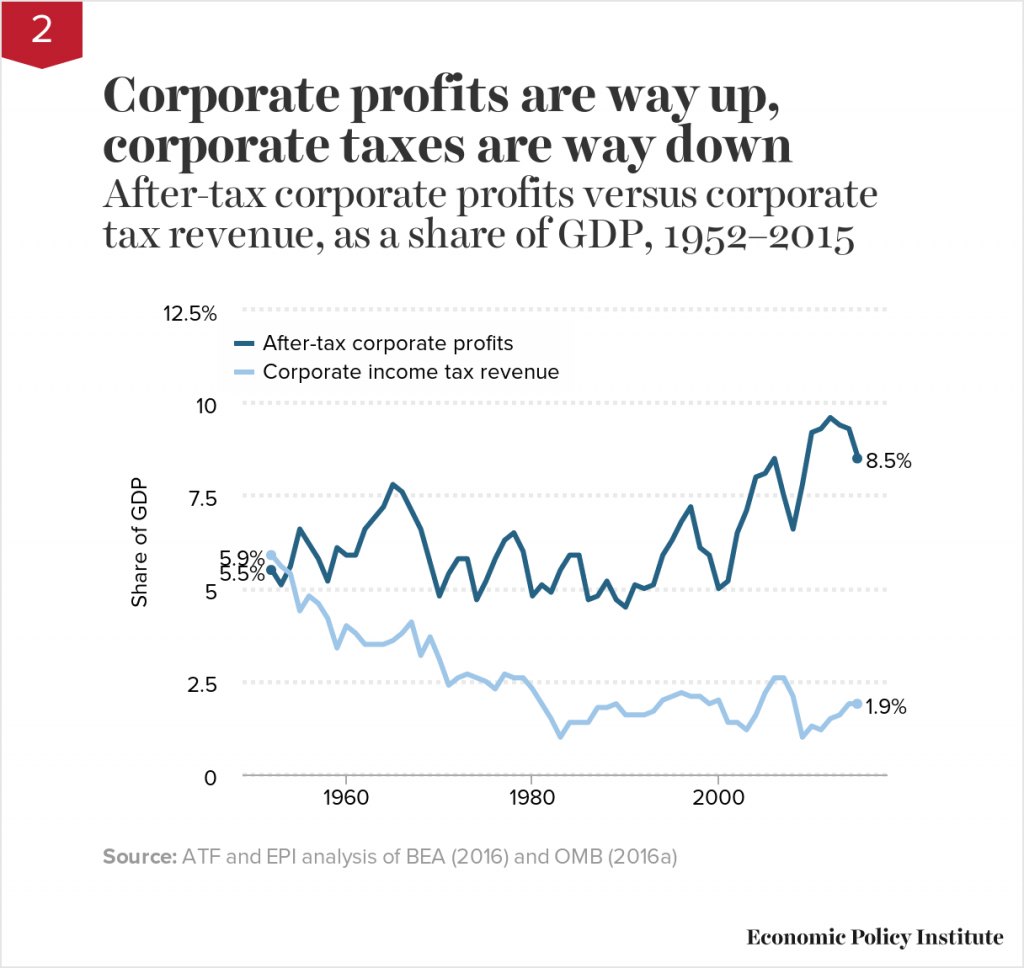
Head Smacker: Trump wrongly claims corporate taxes are too high
President Trump’s address to Congress last month gave us in the human needs community much to smack our heads about. As the Coalition on Human Needs' Debbie Weinstein noted in this piece about Trump’s false promises, he promised better health care while working to repeal the ACA; thanks in part to your advocacy, that effort to kill the ACA failed last week. He called for affordable child care while promoting a plan that will leave out lower-income families who need help the most (and who have already been on the receiving end of cuts to child care assistance). He again called for immigration policies that will separate families and harm low-income workers. And he called for big corporate tax cuts while citing an “alternative fact” about the corporate tax rate.
In his speech, President Trump claimed, “Right now, American companies are taxed at one of the highest rates anywhere in the world. My economic team is developing historic tax reform that will reduce the tax rate on our companies so they can compete and thrive anywhere and with anyone. It will be a big, big cut.”
Numerous different groups have shown that, in fact, U.S. companies aren’t taxed at “one of the highest rates anywhere in the world.” A report out last year from our friends at Citizens for Tax Justice (CTJ) shows that corporate income taxes in the U.S. are significantly less than the average among developed nations. In fact, the U.S. ranks 20th out of 32 developed nations when looking at corporate taxes as a percentage of GDP.
Trump has repeated called for cutting the corporate tax rate from the statutory rate of 35 percent to 15 percent. But many companies don’t pay anywhere near the “official” tax rate, and instead pay a much lower rate thanks to tax breaks and loopholes. A new report from the Institute on Taxation and Economic Policy found that 258 profitable Fortune 500 companies paid an average effective tax rate of just 21.2 percent on U.S. profits between 2008 and 2015. Of these 258 companies, 100 paid nothing in taxes in at least one profitable year during the 8-year period, and a head-smacking 18 companies paid zero in taxes over the entire 8-year period. Together, these 258 companies received $526 billion in tax breaks over this period, with $286 billion in breaks going to just 25 of the most profitable companies.
Other reports have shown similar results. The Government Accountability Office found that profitable U.S. corporations paid an effective federal tax rate of 14 percent on their worldwide income over 2008–2012. While some corporations complain about high tax rates stifling economic growth and profitability, our friends at that Economic Policy Institute and Americans for Tax Fairness note that “since 1952, corporate profits as a share of the economy have risen dramatically (from 5.5 percent to 8.5 percent), while corporate taxes as a share of the economy have plummeted (from 5.9 percent to just 1.9 percent). That is a 55 percent increase in profits and a 68 percent decrease in taxes.” They also note that corporate taxes made up nearly a third of federal revenue in 1952, but now contribute just $1 out of every $9 in federal revenue. Additionally, they point out that corporations owe up to $695 billion in U.S. taxes on $2.4 trillion in profits held offshore.
With last week’s failure of the GOP to repeal the Affordable Care Act, congressional Republicans and the Trump Administration are likely to turn their efforts to tax cuts. It is not clear how broad the effort will be – whether it will focus mainly on corporations or also include tax cuts for wealthy individuals. Trump has also favored tax cuts that reach some in the middle class, although his earlier campaign proposal, by reducing certain deductions or credits, would have increased taxes on some moderate to middle income households. While specifics of tax legislation haven’t been released yet, some tax analysts have said that proposals by forth by House Ways and Means Committee Chairman Kevin Brady (R-TX) would lead to a sizable reduction in federal revenue, while Trump’s proposals would lead to even more severe revenue losses for the government, a transfer of funds overwhelmingly favoring profitable corporations and high-income individuals.
This means at least hundreds of billions of dollars – money that could support any number of human needs programs for children, the elderly, the unemployed, the homeless – including programs slashed in President Trump’s budget – will be lost. The ITEP and Economic Policy Institute/Americans for Tax Fairness pieces show, yet again, that the focus of any corporate tax code overhaul should be on closing loopholes and ensuring companies pay their fair share. Instead, the Trump Administration and congressional leadership will focus on further cutting tax rates for corporations already receiving billions in breaks.
This post was originally published on the Coalition on Human Needs' blog, Voices for Human Needs. Receive similar articles in your inbox by subscribing today, and follow CHN on Facebook and Twitter.



The views and opinions expressed in this post are those of the author(s) and do not necessarily reflect those of MomsRising.org.
MomsRising.org strongly encourages our readers to post comments in response to blog posts. We value diversity of opinions and perspectives. Our goals for this space are to be educational, thought-provoking, and respectful. So we actively moderate comments and we reserve the right to edit or remove comments that undermine these goals. Thanks!